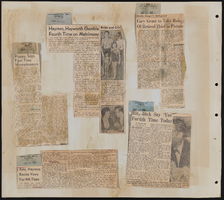Search the Special Collections and Archives Portal
Search Results
Citizen Alert Records
Identifier
Abstract
Citizen Alert is a Nevada-based environmental organization established in 1975 in response to Yucca Mountain being considered as the repository for the nation's nuclear waste. The records in the collection date from 1971-1999, with the bulk of the records from 1988-1996 and focused on issues of concern to Southern Nevada. The collection includes a large subject and administration file containing the organization’s mailings, fliers and newsletters regarding environmental issues and events, newsletters of other environmental organizations, press releases and brochures from a number of government agencies, and newspaper clippings on specific environmental topics. The collection also contains a number of environmental reports from federal, state, and local agencies as well as a number of conference and activist packets.
Archival Collection
Boardwalk Hotel and Casino Records
Identifier
Abstract
The Boardwalk Hotel and Casino Records date from 1993 to 2005 and contain administrative files, gaming projects and systems files, promotional photographs, advertisements, and audiovisual materials pertaining to the Boardwalk Hotel and Casino. The collection also contains material for the Boardwalk under its various names, including the Boardwalk Hotel and Casino, Viscount Hotel, and Holiday Inn Casino Boardwalk.
Archival Collection

Hernando Amaya oral history interview: transcript
Date
Archival Collection
Description
Oral history interview with Hernando Amaya conducted by Laurents Banuelos-Benitez, Marcela Rodriguez-Campo, and Barbara Tabach on October 18, 2018 and December 3, 2018 for the Latinx Voices of Southern Nevada Oral History Project. In this interview, Hernando Amaya talks about his childhood and education in Bogota, Colombia. He discusses his start in journalism as a young man and working for El Espectador, the Colombian national newspaper. He discusses his experiences reporting on the narco-terrorism occurring in Medellin, Colombia and how this eventually led to his immigration to the United States. Amaya moved to Las Vegas, Nevada in 2001 and continued his career in journalism by working for local Spanish speaking papers and websites. He relates his civic involvement in the Las Vegas area, his work as the president of the Colombian Association of Las Vegas, and various other civic engagements. As a journalist, he asserts the importance of knowing one's culture, storytelling, learning history, and being active in the community.
Text
Wolff, Walter P., 1928-2016
http://www.ladailypost.com/content/obituary-walter-p-wolff-dec-29-2016
copied from resouce above
Person
Regional subject files, 1859, 1908, 1970-2015
Level of Description
Scope and Contents
The regional subject files include materials collected by anthropologist Katherine Spilde about Native American gaming, Native American communities in the United States, and the US and international gaming industries. The materials date from 1859 to 2015, with the bulk of materials dating from 1990 to 2010. Materials dating from the nineteenth and early twentieth centuries are a reproduction of a federal treaty and an ethnohistorical essay. The majority of the materials document Native American gaming following the passage of the 1988 Indian Gaming Regulatory Act. The papers include research and subject files created by Dr. Spilde during her employment with the National Gambling Impact Study Commission (NGISC), National Indian Gaming Association (NIGA), and Harvard Project on American Indian Economic Development (HPAIED). The materials document Native American gaming enterprises both on and off reservations, the socioeconomic impact of gaming, the political history of gaming in the US, and international gaming. The series includes socioeconomic reports, testimonies, correspondence, memos, press releases, photographs, audiovisual materials, promotional materials, brochures, fact sheets, summaries, booklets, pamphlets, advertisements, tourism materials, journal articles, legal briefs, legislative documents, court opinions, notes, presentations, conference materials, periodicals, community newspapers, and newspaper articles.
The collection contains documentation on a number of Native American nations, including the Misi-zaaga'iganiing Anishinaabeg (Minnesota Chippewa Tribe, Mille Lacs Band); Gaa-waabaabiganikaag Anishinaabeg (Minnesota Chippewa Tribe, White Earth Band); Forest County Bodéwadmi (Forest County Potawatomi Community); Ho-Chunk Nation of Wisconsin; Mashantucket Pequot Indian Tribe; Mohegan Tribe of Indians; Tulalip Tribes of Washington; Sisseton-Wahpeton Oyate of the Lake Traverse Reservation; Standing Rock Sioux Tribe of North and South Dakota; Mandan, Hidatsa, and Sahnish (Arikara) (Three Affiliated Tribes of the Fort Berthold Reservation, North Dakota); and Mississippi Band of Choctaw Indians. Other communities are also represented in the series, but to a lesser extent. In addition to materials about gaming and casinos, Dr. Spilde also collected documents, photographs, and audiovisual materials about Native American culture in general. The series documents regional and national trends in Native American gaming, and the greater gaming industry. Materials trace federal and state relationships with individual Native American nations, specifically concerning gaming enterprises.
Archival Collection
Collection Name: Katherine A. Spilde Papers on Native American Gaming
Box/Folder: N/A
Archival Component
UNLV Libraries Collection of Boyd Gaming Promotional Materials and Reports
Identifier
Abstract
The UNLV Libraries Collection of Boyd Gaming Promotional Materials and Reports includes annual reports, clippings, financial reports, a press kit, press releases, and promotional materials for Boyd Gaming Corporation in Las Vegas, Nevada, dating from 1986-2009.
Archival Collection
Von Tobel Family Papers
Identifier
Abstract
The Von Tobel Family Papers (1905-1997) consist of photographs, correspondence, and financial reports pertaining to the early Las Vegas Von Tobel family and their businesses, which they operated in Las Vegas, Nevada. The collection also contains newspaper clippings covering the life of Edward Von Tobel Sr. and some of the operational business records of the Von Tobel Hardware Store No. 301.
Archival Collection
Sherwin "Scoop" Garside Papers
Identifier
Abstract
The Sherwin "Scoop" Garside Papers comprise photographs and documents of Las Vegas Review-Journal writer and photographer Scoop Garside. The collection dates from 1930 to 1983 and includes publicity photos of the Old Spanish Trail, correspondence from the Nevada State Centennial Commission, history of mines (Tonopah, Goldfield, Bullfrog), copies of articles written by Garside, family photos and general photographs of people and places, negatives of Las Vegas, Nevada; Searchlight, Nevada; St. George, Utah; and several unlabeled negatives. The 2017 addition contains newspaper clippings, a scrapbook, Nevada Historical Quarterly, and information on Nevada historic preservation. There is also genealogical information on the Garside family.
Archival Collection
Adele Baratz Papers
Identifier
Abstract
The Adele Baratz papers mainly consist of photographs documenting Adele Baratz's life in Las Vegas, Nevada from the 1930s to 2010. An essay and list of names written by Baratz's brother, Charles Salton, document the early history of the Jewish community in Las Vegas.
Archival Collection

